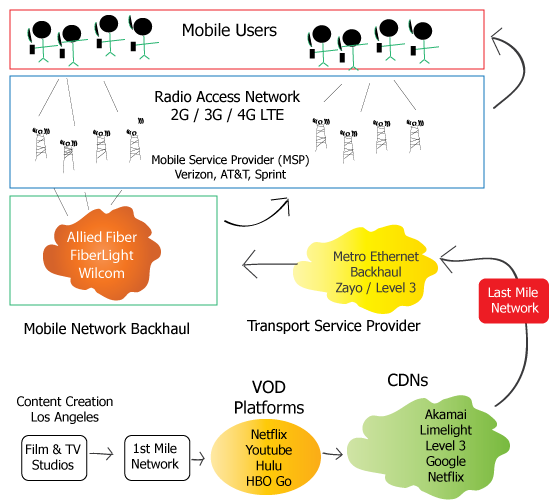The Internet Giants (Google, Facebook, Microsoft and Amazon) have been on a rampage investing in middle mile infrastructure, more specifically dark fiber, submarine cable systems, and to some degree, spectrum for a while now . The two primary reasons: 1) to lower transit cost structure and 2) to exercise greater control of their content delivery efforts. Google is said to have over 100k fiber route miles in place. However, we believe it’s much more than that, since Google has been buying dark fiber close to a decade now. When content providers like Google buy dark fiber, it causes downward price pressure on the network assets, making it more of a commodity or a dumb pipe. That’s one of the reasons Verizon is selling off some of its wireline operations.
Also, lets not forget that another battle is being fought in the last mile between Google and AT&T – Verizon. The last mile is “gold”, because whomever owns the last mile, ultimately owns the customer experience, not to mention, that a bunch of services can be sold to the end user (via last mile). Google understands it, and so does Apple, but Google is taking the lead in this effort, and taking the fight for control of last mile to AT&T and Verizon’s door step, not only in the wireline business, but also in the wireless. It doesn’t take a rocket scientist to figure out what Google is up to.
Googles Expands Efforts from Middle Mile to Last Mile
- Middle-Mile: Google invest in dark fiber, submarine cable systems, and spectrum to a small degree
- Last Mile: Google Fiber is expanding its footprint across the US, and the recent ruling on Net Neutrality will likely help them grow faster to more cities
- Wireless Last Mile: Google partners with Sprint and T-Mobile to sell wireless services
- Wireless Last Mile: Google’s rumored upcoming MVNO service with Sprint and T-Mobile allows them to “hunt for the best available cellular or Wi-Fi signal to route voice, text message and data traffic”
- Wireless Last Mile: Google conducts test on the 71-76 Ghz and 81-86 Ghz millimeter wave bands, which means “Google may be using the millimeter wave bands to test the transmission of large amounts of data over short distances”
Is Google Planning on Buying Low-band spectrum Next Year
The spectrum auction next year is more valuable than the recent AWS-3 auction, because it give better reach into homes and offices. According to a recent article, “Wireless spectrum is considered the life-blood of the wireless industry”; AT&T and Verizon control the “vast spectrum of licenses throughout the country”; the “upcoming incentive spectrum auction is likely the last major auction the FCC will have for several years”.
Is all this activity a precursor to Google’s next move? Google selling Sprint and T-Mobile services might only be warm up practice for something bigger, like spending billions in acquiring low-band spectrum next year. If there is anyone that can outspend AT&T and Verizon in next year’s auction, that would be Google, with its $64B cash war chest.


